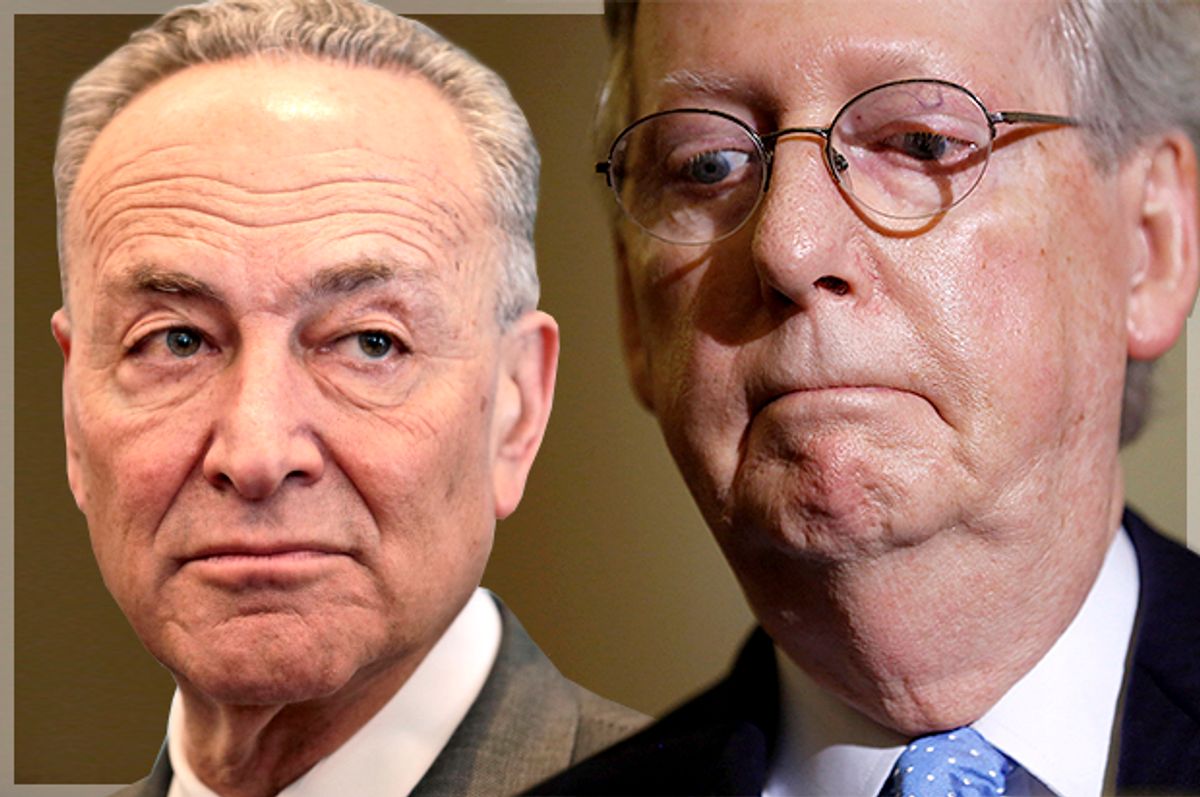As the hours tick away before a partial federal government shutdown, Republicans and Democrats are trying to pin the blame on each other.
Less than fours before the federal government is set to run out of funding, there is still no budget compromise between the Republican-controlled chambers of Congress and the president. In the Senate, the prospects of a House-passed bill to temporarily keep the government open until the middle of February remained in doubt on Friday. Although Republicans control the chamber, they cannot pass funding bills without Democratic support to reach the 60-vote threshold imposed by Senate rules. Thus far, most Democrats in the Senate have said they will not support the "continuing resolution" unless it includes an allocation for the Children's Health Insurance Program (CHIP) and also language to exempt a subset of undocumented immigrants who were granted deferred priority for deportation from the Obama administration.
The House's ability to pass a partisan funding resolution late Thursday night represented a significant victory for Speaker Paul Ryan, R-Oh., because it shifted the onus to the Senate. The House bill included a six-year reauthorization of the widely popular CHIP program, which should woo Democrats up for reelection in red states won by Donald Trump in 2016.
Earlier in the month, a group of Republican and Democratic senators announced they had reached an immigration but those negotiations did not include House members or administration officials and the deal was rejected out of hand by Republicans for not including funding for a partial wall on the U.S-Mexico border. The frequently divided Republican majorities in both chambers which have repeatedly struggled with conflict over budgets.
The discussions have been repeatedly disrupted by President Trump who has provoked controversy from members of both parties, first by appearing to endorse Democratic efforts to preserve protections offered by former president Barack Obama's Deferred Action for Childhood Arrivals (DACA) program, then by his offensive characterizations of Haiti and African nations as "s**thole countries," and a Thursday tweet opposing the inclusion of the long-term CHIP reauthorization.
The shutdown showdown has created an interesting dynamic where Trump and many members of the GOP who had previously spoken in favor of using the threat of a shutdown as a bargaining tool are now opposing the idea.
At a Friday news conference, Mick Mulvaney, a former Republican congressman who now heads the White House Office of Management and Budget referred to the impending government closure as "the Schumer Shutdown," after Senate Minority Leader Chuck Schumer, D-Ny.
"I just want to let everybody know that we don't want this," Mulvaney said. "We do not want a shutdown. But if Mr. Schumer insists on it, he is in a position to force this on the American people."
During his briefing, Mulvaney did not apologize for his prior support of a 2013 effort of House Republican hard-liners to shut down the government to prevent the implementation of the Affordable Care Act. He also did not mention nor was he asked how he reconciles his conflicting present and past views.
While Trump is today expressing opposition to shutting down the government, in May, he argued on Twitter that "our country needs a good 'shutdown' in September to fix mess!"
In August of 2017, Trump said he was willing to shut down the government in order to get his wall on the U.S.-Mexico border funded.
"The government shutdown is a sign of just how broken the Republican Party is," David Frum, senior editor of The Atlantic, recently told Salon. "Well because there's certain, everyone just understands, that there's a certain percentage of the Republican Party that will never vote for the financing to raise the debt ceiling to allow the government to continue to operate."
The Republican victory in forcing Democrats to have to cast a difficult vote has also led Schumer and his House counterpart, Rep. Nancy Pelosi, D-Calif., to be confronted with their own past statements against including unrelated demands into budgetary negotiations.
“The basic line is: No matter how strongly one feels about an issue, you shouldn’t hold millions of people hostage. That’s what the other side is doing. That’s wrong and we can’t give in to that,” Schumer had said in a 2013 interview.
Pelosi had used similarly strong language against Republican shutdown advocates in 2013.
“I call them 'legislative arsonists,'” she said in a discussion with CNN. “They're there to burn down what we should be building up in terms of investments and education and scientific research, and all that it is that makes our country great and competitive,” she added.
Both parties seem to think that they will not have to compromise on the immigration issue. Polling suggests they might be right.
In a Washington Post survey released on Friday, 48 percent of respondents said they would blame Republicans and Trump for a shutdown compared to just 28 percent who said that Democrats would be at fault.
At the same time, however, a CNN poll also released on Friday found that 56 percent of respondents said that avoiding a shutdown was more important than continuing DACA. Just 34 percent said that continuing the program was more important.
In the event a shutdown does happen, Mulvaney vowed on Friday that his budget management agency would work to make it as painless as possible, unlike what he said the Obama administration had done when it allegedly "weaponized" the shutdown. If Mulvaney is able to minimize the impact of a partial government closure, it actually could incentivize both parties to dig into their positions.

Shares